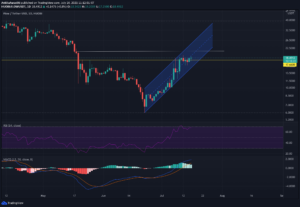
The crypto industry has long skirmished with regulatory authorities over whether cryptocurrencies are securities that ought to be more strictly regulated, or whether consumers are afforded adequate protection. The Russian invasion of Ukraine, however, shifted the focus of the debate to whether the crypto industry provides enough safeguards against money laundering and other financial crimes. At present, there are 18,162 cryptocurrencies in operation, 460 cryptocurrency exchanges, and a total market capitalization of just under $2 trillion. In this crypto ecosystem, over $91 billion worth of crypto is traded with the majority of transactions involving Ethereum or Bitcoin. Bitcoin and other cryptocurrencies promise relatively anonymous cross-border transactions free from state oversight and unencumbered by the formalities of the conventional banking system. Ordinarily, cryptocurrencies inspire talk of privacy, freedom, and community. Russia was hit by a raft of financial sanctions which effectively blocked a large part of its access to the US Dollar-backed global financial system but some experts have raised concerns that crypto currencies might give an avenue to Russians to preserve their wealth. At the same time, cryptocurrencies may also enable the victims of Russia’s aggression to ease their suffering. The Crypto War Paul Jossey has touted the Russian invasion of Ukraine as the first crypto war, stating that the battle on the digital asset front is second only to the actual fighting in importance. Cryptocurrency has had significant involvement throughout the crisis, from the Ukraine government’s requests for aid in Bitcoin and Ethereum to both Russia and Ukraine’s use of stablecoins for refuge, as well as the angst of American and European bureaucrats over crypto being used to bypass sanctions. Gilian Tett believes the war in Ukraine could serve as an accelerant of the cryptocurrency sector. The millions of dollars’ worth of aid in crypto sent to Ukraine is a symbol of the global order shifting, from one that is shaped by hierarchical institutions to one that is shaped by networks. As Bridgewater hedge fund told clients, the Russian invasion of Ukraine is the first major event where cryptocurrencies are part of the equation. BlackRock CEO Larry Fink also touted Russia’s invasion of Ukraine as a potential accelerant of the adoption of crypto by central banks, adding that it is a less-discussed outcome of the war. Crypto As a Force for Good Donors from all around the world have supported the Ukrainian government’s war effort by donating cryptocurrency, including Dogecoin and Bitcoin after the Ukraine government set up digital wallets to receive the funds. Ukraine’s Ministry of Digital Transformation, under Alex Bornyakov, is even planning to launch a collection of NFTs that may help raise money for the war effort. According to Elliptic Enterprises Ltd., an analytics firm, the Ukraine government alongside a number of NGOs had received up to $63 million worth of cryptocurrency donations as of 9th March, a figure that hit $100 million just a week later. On the other hand, in Russia citizens are also using cryptocurrency as a lifeline as a result of the collapse of the value of their currency due to the financial sanctions leveled by the west. The Ukrainian banking system’s weakness has also killed confidence among the population and some suppliers receiving payment in crypto opt not to convert it into Hryvnia, Ukraine’s local fiat currency. Cryptocurrency As a Tool for Evading Sanctions Western nations such as the United States, United Kingdom, and their G7 allies are concerned that Russian individuals and entities targeted by the sanctions will move to digital currencies to trade and invest outside the country while avoiding the financial authorities that could trace the transactions. These worries are based on the fact that cryptocurrencies can be exchanged in a peer-to-peer network and it is difficult to attach a digital identifier to the individual behind it. The U.S. Treasury Department’s Office of Foreign Assets Control issued fresh guidance in early March emphasizing that U.S. citizens and firms handling digital assets are obliged to comply with sanctions against Russia. There is no evidence at the moment to suggest that any Russian organization or individual has used cryptocurrency to evade sanctions, although early in the conflict there was a spike in trades involving Bitcoin and Rubles. This early activity has been put down largely to investors buying crypto as a fallback due to the crash in the Ruble’s value because since then trading has returned to relatively low volumes. Additionally, the Biden Administration itself is unconvinced that crypto is a viable tool for the Russian state to effectively evade sanctions. Crypto Regulation and Sanctions In early March, the U.S. government through an executive order announced a task force to enforce its sanctions comprised of the FBI, IRS, interagency law enforcement, the Secret Service, Postal Inspection, and Homeland Security. The taskforce’s target will be crimes committed by Russian officials, government-aligned … Continued
The post The War Against Crypto Continues As More Countries Launch Sanctions first appeared on Cryptoknowmics-Crypto News and Media Platform.
The post The War Against Crypto Continues As More Countries Launch Sanctions appeared first on Cryptoknowmics-Crypto News and Media Platform.
- Coinsmart. Europe’s Best Bitcoin and Crypto Exchange.
- Platoblockchain. Web3 Metaverse Intelligence. Knowledge Amplified. FREE ACCESS.
- CryptoHawk. Altcoin Radar. Free Trial.
- Source: https://www.cryptoknowmics.com/news/the-war-against-crypto-continues-as-more-countries-launch-sanctions/?utm_source=rss&utm_medium=rss&utm_campaign=the-war-against-crypto-continues-as-more-countries-launch-sanctions
- "
- access
- According
- activity
- administration
- Adoption
- alex
- All
- Although
- American
- among
- analytics
- announced
- around
- asset
- Assets
- Banking
- Banks
- Battle
- being
- believes
- biden
- Billion
- Bitcoin
- BlackRock
- Block
- Buying
- capitalization
- Central Banks
- ceo
- collection
- community
- confidence
- conflict
- Consumers
- continues
- control
- could
- countries
- country
- Crash
- Crimes
- crisis
- cross-border
- crypto
- crypto currencies
- Crypto ecosystem
- Crypto Industry
- cryptocurrencies
- cryptocurrency
- Cryptocurrency Exchanges
- currencies
- Currency
- debate
- difficult
- digital
- Digital Asset
- Digital Assets
- digital currencies
- Digital Transformation
- digital wallets
- Display
- Dogecoin
- donations
- down
- Early
- ecosystem
- Elliptic
- enable
- entities
- ethereum
- European
- Event
- Exchanges
- executive
- executive order
- experts
- fbi
- Fiat
- Fiat currency
- Figure
- financial
- Firm
- First
- Focus
- Free
- Freedom
- fresh
- fund
- funds
- Global
- good
- Government
- Handling
- help
- Homeland Security
- HTTPS
- importance
- Including
- individual
- industry
- institutions
- Investors
- IRS
- IT
- itself
- Kingdom
- large
- launch
- Law
- law enforcement
- local
- Long
- major
- Majority
- March
- Market
- Market Capitalization
- Media
- million
- millions
- money
- Money Laundering
- more
- move
- network
- networks
- news
- NFTs
- number
- order
- organization
- Other
- payment
- planning
- population
- potential
- present
- privacy
- protection
- provides
- raise
- receive
- Regulation
- regulatory
- requests
- Russia
- Sanctions
- Secret Service
- sector
- Securities
- security
- service
- set
- significant
- some
- Stablecoins
- State
- States
- suppliers
- Supported
- system
- Talk
- Target
- task force
- the world
- Through
- throughout
- time
- tool
- trade
- trades
- Trading
- Transactions
- Transformation
- u.s.
- U.S. government
- Ukraine
- Ukrainian
- United
- United Kingdom
- United States
- us
- use
- value
- victims
- Wallets
- war
- Wealth
- week
- West
- whether
- while
- world
- worth













